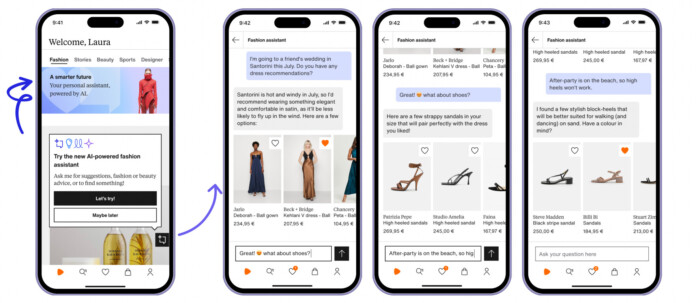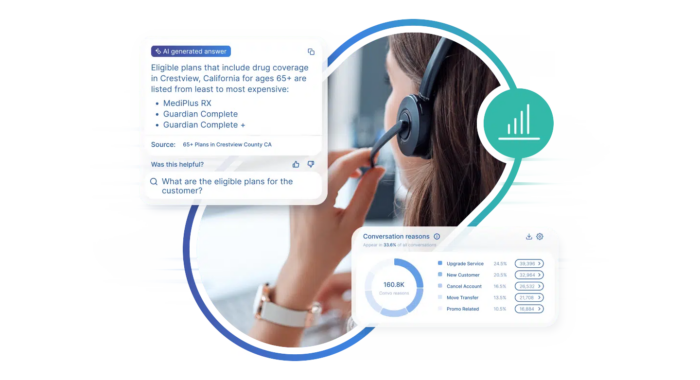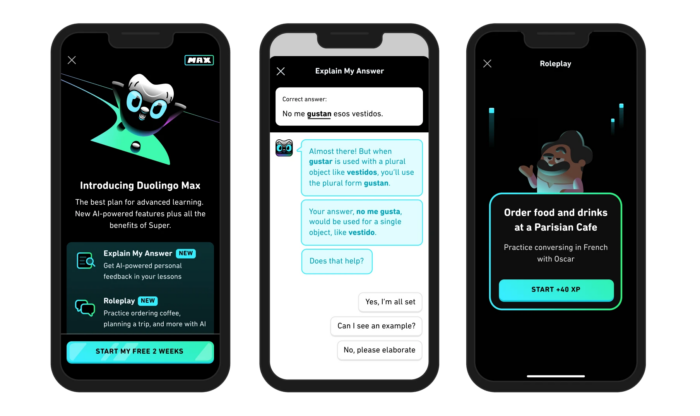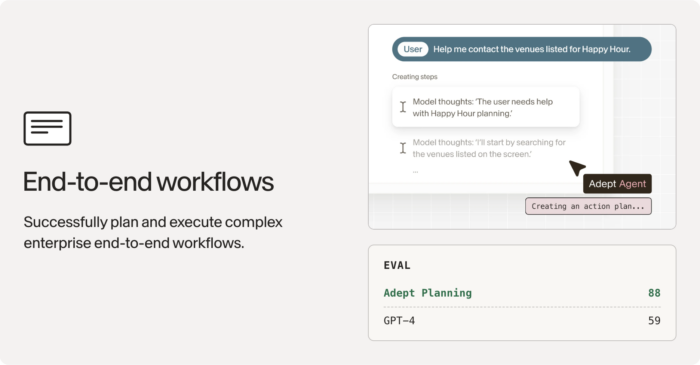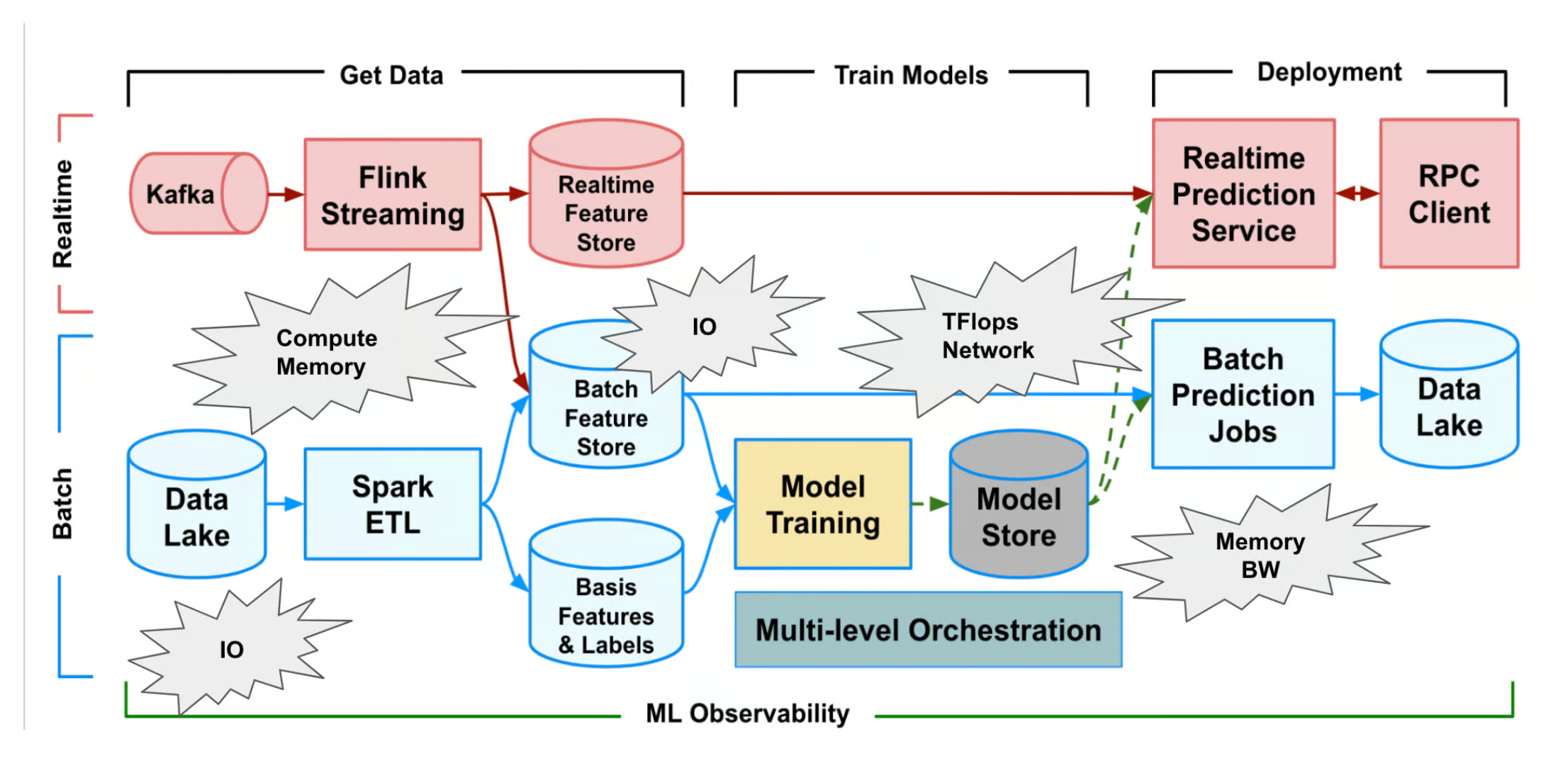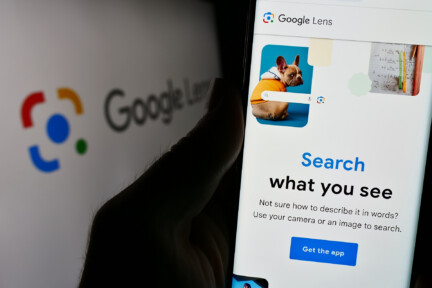As businesses strive for greater efficiency and innovation in today’s fast-paced market, emerging technologies like Generative AI have become essential tools for achieving success and growing revenue. With GenAI products, companies can tap into the power of cutting-edge language models, such as GPT, Gemini, Llama, Mistral, and Claude, to unlock new levels of creativity, productivity, and problem-solving.
For more than a decade, modern Artificial Intelligence (AI) has been applied in various domains, such as threat detection, predictive analytics, and product recommendation. It remains a prominent and widely discussed topic in the technological landscape.
These advanced systems are reshaping how we think about computing, enabling us to generate original content and create advanced reports or automatically identify risks for key supply chain processes and develop complex software—all that as if by magic, just in a few seconds!
As the Chief AI Officer in Miquido, I believe it’s essential to understand how these Generative AI tools can be implemented into core business processes to drive growth and stay ahead of the competition. Especially since their capabilities are available to everyone, even those lacking specific machine learning skills or having no technological expertise. With that said, how can businesses utilise GenAI’s skills to boost development and maintain an edge over rivals? Let’s look at some most exciting commercial applications.
AI Adoption Statistics
Before we dive into examples of GenAI applications, it’s important to highlight how the growing interest in Generative AI technologies has expanded the focus on broader AI capabilities. According to McKinsey research, over the past six years, approximately half of the surveyed organizations have adopted artificial intelligence technologies. However, last year has seen a substantial increase, with adoption rates soaring to 72%. From customer service and fraud detection to processing insurance claims and drug discovery, AI models set the new benchmarks for efficiency.
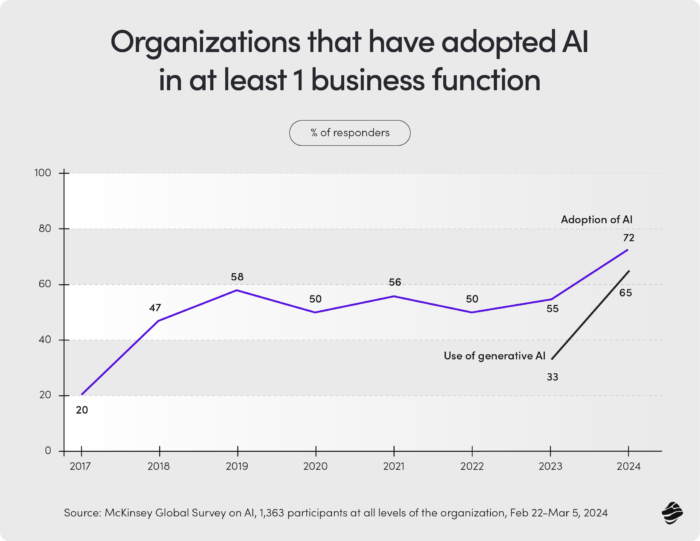
Ensuring AI Success in Organizations
Despite research showing that 80% of AI projects fail to move beyond the Proof of Concept stage, Miquido’s track record of over 30 successful AI projects highlights the key to overcoming this common challenge: rapid yet robust artificial intelligence development.
Generative AI holds immense business potential, offering companies opportunities to scale, save costs, and achieve high ROI. For entrepreneurs or organizations considering buying a business, leveraging AI in this way can provide a major competitive edge by uncovering efficiencies and growth opportunities early on. The critical factor in AI project success lies in the ability to quickly prototype solutions while ensuring they are production-ready.
“Our experience enables clients to benefit from a fully personalized AI demo in just two days, and our efficient framework AI Kickstarter allows us to transform this into a full-scale AI product in about four weeks. This combination of speed and quality is why our clients consistently outperform market expectations, turning AI potential into tangible business results.” – Jerzy Biernacki Chief AI Officer at Miquido.
To demonstrate this, we have curated 25 compelling Generative AI examples across various business functions. Some of them are our client’s real examples of successful Gen AI implementation, others are carefully hand-picked instances of AI appliances by industry leaders and innovators.
Not enough data? GenAI can fill the gaps
Even in industries where relevant data is scarce, generative AI can bridge the gap by producing AI generated synthetic data that mimics real-world patterns without exposing sensitive information. By combining robust data management practices with a security operations platform, organizations can ensure that this synthetic data meets compliance requirements and is safe to use for model development.
For example, generative adversarial networks can be deployed to create realistic transaction records or customer interaction logs that feed into machine learning models, helping them perform well even when training data is limited. Leveraging Google Cloud infrastructure ensures scalability and security throughout the process.
This approach opens doors to advanced use cases like code generation, sentiment analysis, and personalization — all powered by foundation models fine-tuned on synthetic datasets. In practice, a retail company with limited historical customer feedback could use GAN-generated reviews to train a sentiment model that predicts shopper satisfaction.
he result: more accurate predictions and faster deployment, without waiting years to gather enough data. By pairing synthetic augmentation with careful governance, businesses turn the lack of initial data from a roadblock into a competitive advantage.
How can you use Generative AI in customer assistance?
Chatbots powered by Generative AI capabilities are changing the game in customer service, offering businesses robust support for their end users and employees with a range of powerful applications for engaging with customers, quickly resolving issues, and building loyalty.
By leveraging techniques like retrieval augmented generation, these chatbots can tap into historical data and relevant data points to deliver accurate, context-aware answers — all while maintaining strict data security standards.
Mobile applications equipped with AI-driven chatbots can lay claim to a competitive advantage with outstanding customer support. From responding to customer reviews quickly and using automatic replies on platforms like Yelp and Google, to providing fast and efficient help, companies can boost in-app engagement and user satisfaction. As Generative AI continues to evolve, these tools will get even better at interpreting customer needs, learning from interactions, and adapting their training models for improved performance over time.
Providing users with real-time updates and tips for resolving technical issues — paired with quick, empathetic responses — can defuse tensions and turn negative experiences into positive ones, creating meaningful connections and growth. What’s more, models like GPT-4 can eliminate time-consuming document searches or FAQ browsing.
By using natural language queries, Generative AI chatbots enhanced with retrieval augmented generation can help customer support teams surface the right information instantly. Ultimately, these solutions can significantly enhance customer assistance by analyzing behavior to offer more personalized and relevant support, while ensuring every interaction is efficient, secure, and data-driven.
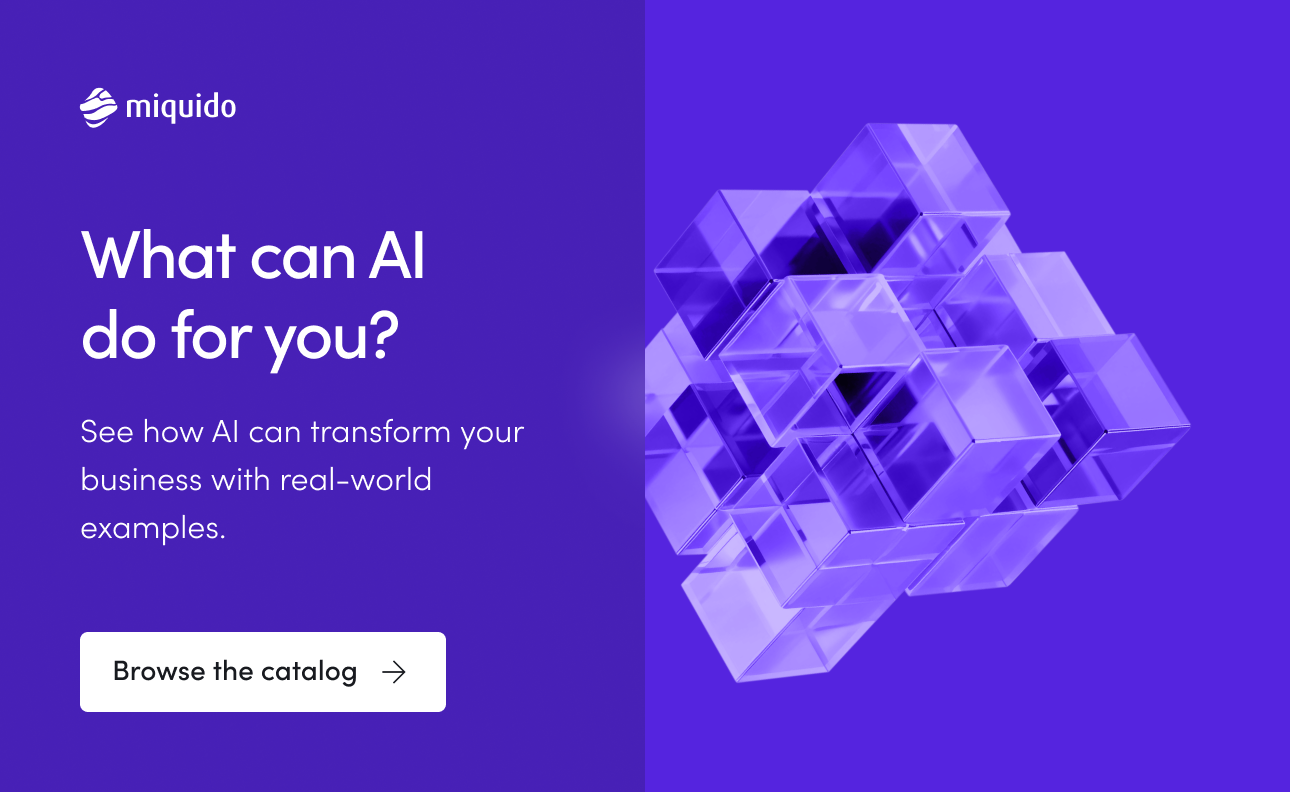
AI in customer assistance: Examples
Nowadays, we’re seeing more and more exciting use cases and business attempts to discover the possibilities behind AI-powered chatbots. According to Eugene Mann, the product lead for Stripe’s Applied Machine Learning team, their objective was to identify products and workflows that could be accelerated by large language models, as well as to gain a better understanding of where these models excel and where they face challenges.
Stripe’s Integration of GPT-4
After compiling a list of 50 potential applications for testing GPT-4, Stripe’s team reviewed and tested the prototypes. The results? The team has identified 15 promising prospects for integration into Stripe’s platform, such as customising support, responding to support queries, and detecting fraudulent activities.
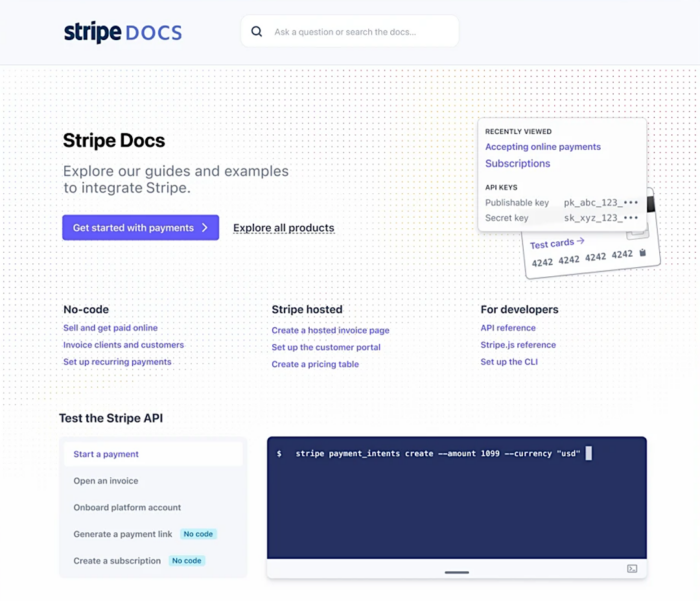
What’s more, OpenAI will leverage Stripe’s Link application to automatically fill in saved payment details, which is expected to speed up the payment process for DALL-E users by an average of 40%, according to the company.
Shopify Inbox customer assistance case study
Other examples of ChatGPT-powered customer assistance apps include Shopify’s free messaging tool Shopify Inbox, where AI is intended to assist consumers in making product selections by, for instance, asking more questions to narrow down the product option, spotting chats that convert and sharing products right from chat.
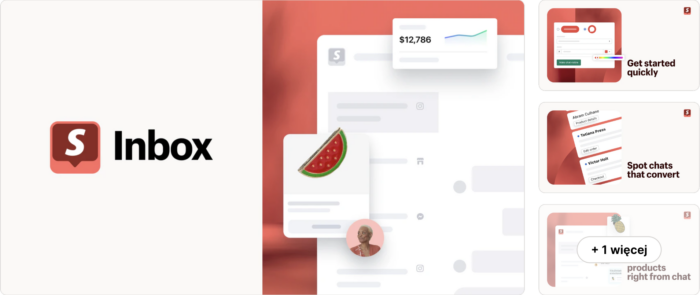
Pangea AI-driven document parsing
Pangea, a global development marketplace connecting companies with top development agencies, faced challenges with rapid growth and increasing user registrations. To address this, Miquido developed an AI engine that efficiently extracts key information from resumes and project case studies, accelerating profile completion and reducing manual work. The solution integrated multiple LLMs, ensuring reliable data processing and scalability. Key outcomes included faster specialist onboarding, standardized profiles, enhanced privacy with data anonymization, and a scalable infrastructure to support continued growth.
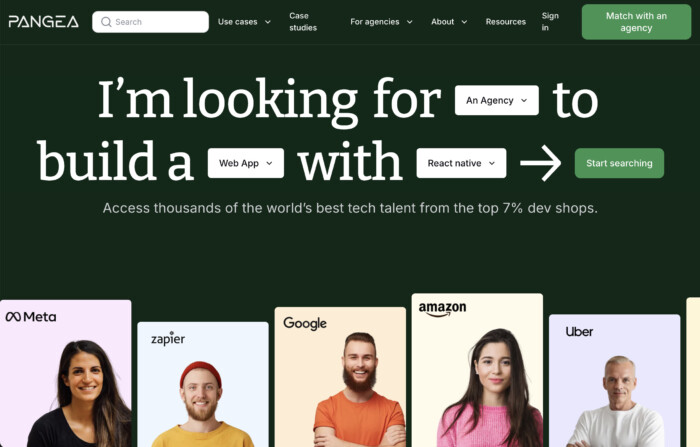
Zalando GenAI-powered fashion assistant
Need more recent Generative AI use cases? A prominent European online fashion and lifestyle platform, Zalando, will soon introduce a fashion assistant beta version powered by ChatGPT on its app and web platforms. This innovative feature will allow customers to explore and shop through Zalando’s extensive range using their own fashion terminology and words, thus providing a more intuitive experience. The initial release of the beta version of these virtual assistants will be restricted to a chosen set of customers and is expected to be rolled out by Spring.
“At Zalando, our customers have always been at the centre of everything we do. As a leader in fashion e-commerce in Europe for 15 years, we have consistently embraced new technologies to enhance our customers’ shopping experience. We are excited to be experimenting with ChatGPT to help our valued customers discover even more fashion they will love”, says Tian Su, VP of Personalisation and Recommendation at Zalando.
With GenAI’s rapidly evolving capabilities, we can only expect more companies to leverage generative models’ potential in customer assistance, leading to more efficient, personalized, and satisfying experiences for both customers and businesses. Notably, several innovative projects launched in 2024 highlight this trend, showcasing advancements in AI-driven customer interactions and support.
Social Bee’ AI-powered translation tool
Social Bee, based in Munich, partnered with Miquido to develop an AI-powered translation tool during the Hack To The Rescue hackathon, completed in just 32 hours. This tool, utilizing GPT-3.5, efficiently translates complex legal documents, ensuring accessibility for refugees facing language barriers. The solution reduced document processing time by 30%, optimized Social Bee’s operations, and won first prize at the hackathon, showcasing the impact of innovative AI-driven solutions on user satisfaction and operational efficiency.
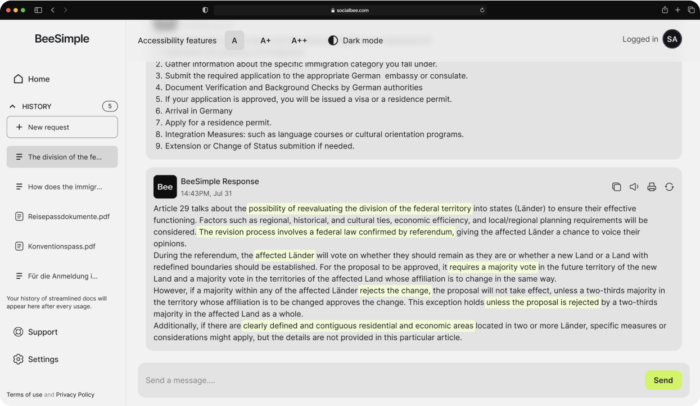
How can you use Generative AI in marketing?
To successfully implement AI-driven personalised content and business-specific assistants in marketing and sales, businesses must first identify areas where this technology can have the most significant impact and establish a system for monitoring its progress.
In case you are planning to build it from scratch, it is essential to assemble a cross-functional team comprising data science experts, skilled developers, designers and functional business leaders to ensure successful implementation and efficient operation. However, from day to day new custom solutions arise, creating the possibility to incorporate the AI-based tools into your own marketing strategies and sales with just a few clicks. Some of the available solutions may be added to your mobile or web app with just the help of a Generative AI company.
Examples of Generative AI in marketing
The use of Generative AI solutions in marketing provides significant advantages for creative, marketing and design teams by allowing quick and efficient high-quality content creation. Major companies such as Adobe, Canva, Microsoft Designer and Shutterstock already offer generative AI tools for editing images, creating graphics, and generating videos.

Synthesia, Lumen5, and Supercreator: Generative AI Content Creation
In addition, social media apps such as Synthesia, Lumen5, and Supercreator use AI-generated videos and realistic images to create engaging and personalised content for their users. The ability to create realistic avatars and use filters or effects can also help marketers enhance the user experience and increase customer engagement. By leveraging Generative AI's ability, marketing teams can create compelling content that resonates with their target audience and boosts conversions.
The latest version of GPT, GPT-4, offers increased creativity and collaboration capabilities, enabling it to generate, edit, and co-create with users on creative and technical writing tasks. Examples of these tasks include composing songs, creating music, creating realistic speech audio, writing screenplays, or learning a user’s writing style through iteration. All of these capabilities can reinforce the creative teams in your company, contributing to better brand recognition and product popularity.
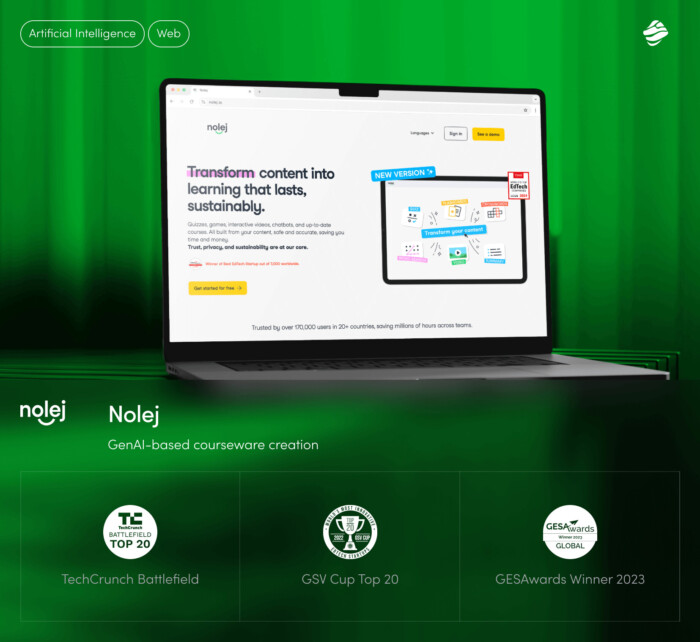
Coca-Cola: Generative AI in marketing campaigns
Coca-Cola has been leveraging AI models to enhance its marketing efforts by personalized content creation like ad copy, images, and even interactive experiences. In collaboration with OpenAI and Bain & Company, Coca-Cola launched the “Create Real Magic” platform, which uses OpenAI’s GPT-4 and DALL-E to enable digital artists to create original artwork using iconic Coca-Cola assets.
This initiative is part of a broader strategy where Coca-Cola uses AI tools to improve marketing effectiveness, audience engagement, and operational efficiency, making it a pioneer in the application of generative AI in the consumer goods sector.
YouMap seamless AI integration
YouMap is a social network focused on discovering and sharing hobbies globally. In this case, the company partnered with Miquido to integrate Generative AI systems. Together, we enhanced the platform by developing a custom AI-powered feature using GPT and API integration, allowing users to automatically generate maps and points of interest from brief descriptions. This AI-driven feature improves user experience by addressing content moderation, formatting, and consistency, making the platform more intuitive and engaging.
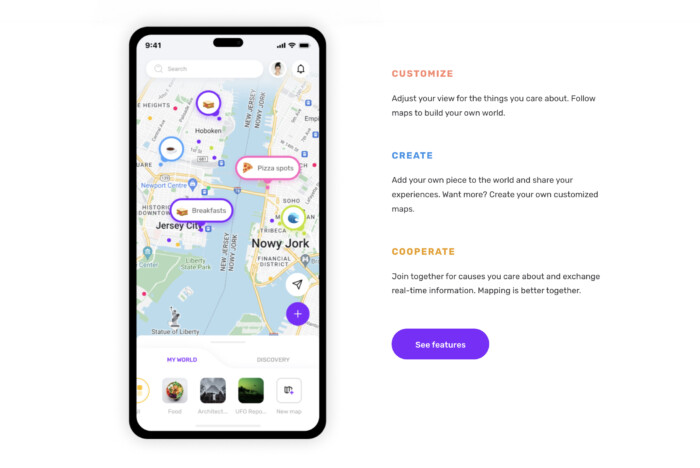
How can you use Generative AI in sales?
Generative AI can meaningfully help improve sales performance and streamline the sales process. One of the main benefits of using GenAI is the ability to flag risks and identify potential problems before they become major issues, all while ensuring data privacy is maintained throughout.
Generative AI can analyze customer data and interactions — even pulling insights from a search engine query history or internal knowledge base — to identify patterns indicating the loss or risk of a potential sale. It can also help sales teams segment customers based on their needs and preferences, allowing for more personalised and targeted sales efforts.
With the help of AI-based features, sales teams can proactively mitigate risks and avoid losing valuable deals. For example, they can analyze the transcripts of meetings and e-mail exchanges with customers and flag the risk based on external elements of the conversation (e.g., capturing customer requests and objections).
They can also perform automatic meeting analysis to discover who and how talks about the company and how customers react to it, ultimately using these insights to increase sales productivity by focusing on areas that need improvement. These AI-driven insights can even spark new creative processes — from refining sales scripts to developing more persuasive presentation materials.
Cresta’s AI tool for personalized messaging
Another benefit of using Generative AI is recommending the following interactions and suggesting personalised messaging for customers. By analysing customer data and behaviour, GenAI can offer the most effective communication methods and messaging for follow-up customer interactions. One of the new solutions on the market was introduced by Cresta.
The tool helps sales teams discover winning sales behaviours, determine whether some of them are being followed, and reinforce those behaviours in real-time with real-time guided selling. This can improve customer satisfaction and engagement and ultimately lead to more successful sales outcomes.
Best buy’s AI sales operations optimization
Another example of generative AI supporting sales and growth teams is Best Buy’s use of its Gemini platform. This consumer electronics company is leveraging this AI technology to launch a virtual assistant aimed at enhancing customer service and optimizing sales operations.
Their AI assistant can handle a variety of tasks, including troubleshooting product issues, rescheduling deliveries, and managing Geek Squad subscriptions. With the integration of AI tools, both in-store and online customer service teams are now better equipped to assist customers efficiently, contributing to growth and boosting overall sales performance.
Generative AI in software development
GenAI is a powerful tool for speedy mobile and web application development. The technology can save developers time and effort in the coding process by analysing code and automatically writing parts of the solutions. Additionally, AI can be used to identify and fix errors in code, reducing the need for manual debugging and allowing developers to focus on other aspects of app development.
GitHub Copilot: Boosting developer productivity
One of the top examples is Github Copilot. According to its data, the tool allows developers to speed up coding even by 96% (with most repetitive tasks), concentrate on larger issues, and remain in the flow longer, contributing significantly to their job satisfaction (88%).
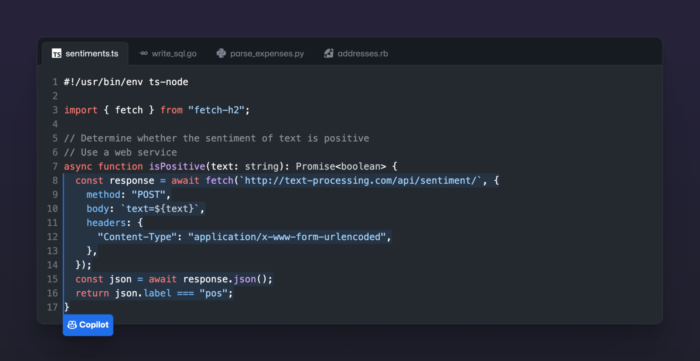
OpenAI Codex, a generative pre-trained language model developed by OpenAI, powers GitHub Copilot. It is available as a Visual Studio Code, Visual Studio, Neovim, and JetBrains integrated programming environment (IDE) plugin.
Hugging face: AI innovation
Available enhanced communities built around machine learning algorithms and models are highly popular among developers. For instance, Hugging Face enables thousands of creators to work as a community to solve Audio, Vision, and Language tasks with AI. Fans of AI-based solutions gather to create better digital products to serve millions of users and meet their ever-growing expectations.

Miquido’s AI use cases
To gather another point of view, I asked my colleague Łukasz Boruń, AI Solution Architect and Team Leader in Miquido, to share his insights and experience with GenAI.
“In order to gain a deeper understanding of the realistic outcomes and potential profits we can achieve by incorporating artificial intelligence into our daily approach to tasks and responsibilities; we have assembled an in-house AI team. This specialised team is working diligently along two parallel streams to ensure the successful integration of GenAI in our operations:
Technical:
- Continuous identification of bottlenecks and challenges within the organization through systematic surveys and fostering awareness about this technology across the company.
- Categorization of the most suitable technology or solution for each use case. We recognize that AI may not always be the optimal choice for the client’s problem, and in some cases, automation might provide a better solution. Our advisory process is always guided by a strong focus on maximizing ROI for the client and business value.
- Implementation of Generative AI (GenAI) solutions for our clients. Leveraging our proprietary AI Kickstarter framework, we efficiently deliver GenAI solutions at a relatively low cost, ensuring speed and effectiveness in deployment.
Business:
- The second stream revolves around addressing key concerns surrounding security and confidentiality and celebrating our initial successes. It is of utmost importance that the Generative AI solutions we choose to implement have clear and transparent privacy policies that are easily understandable by all stakeholders. This not only ensures that our proprietary information remains secure but also fosters trust among our clients and partners.
In a nutshell, Generative AI tools that can generate code help companies speed up software development, enabling developers to create high-quality apps more quickly and efficiently. By automating many of the tedious and time-consuming tasks involved in design, testing, and deployment, developers and designers can focus on the more creative and strategic aspects of their work, leading to better outcomes and a smoother development process.
How can you use Generative AI in application design?
Moreover, Generative AI-powered tools have revolutionised part of the design process in mobile and web creation, providing developers and designers with powerful tools to create, mock-up, test, and deploy applications. These tools can today assist designers in swiftly creating prototypes that are both practical and visually appealing. Additionally, by implementing Generative AI tools into user testing, tasks allow developers to gather feedback and insights from users in a more streamlined and efficient manner.
Loft: Rapid prototyping with Gen AI
Loft, a design agency, used Generative AI tools like GPT-4 and Midjourney to enhance their product development process. They began by using GPT-4 to brainstorm and suggest new product features based on known customer preferences. The team then moved to the visual design stage, where they employed Midjourney to refine their initial sketches into detailed prototypes. This AI-driven approach allowed them to rapidly explore and iterate on design ideas, ultimately leading to more efficient user testing and quicker refinement of their concepts.
How can you use Generative AI in data analysis?
In recent times, analysing structured data such as transaction records and click streams has become a mastered art for human beings. However, with the emergence of pre-trained transformers, text analysis is becoming just as easy as analysing numbers.
This breakthrough technology can help machines process language and reinforce human work in text analysis. For instance, Generative AI can assist in data analysis such as customer reviews, social media posts, and call centre transcripts to identify patterns and anomalies humans may miss. Going further, backing up your analysis with AI reinforces your decision-making teams with forecasts, deep research and data visualisation.
Generative AI in data synthesis
AI systems are used to synthesize medical data for research purposes. For example, companies like Syntegra utilize AI to create synthetic healthcare datasets that mirror real patient data while maintaining privacy. It is becoming increasingly common use case of Generative AI in manufacturing, allowing researchers to perform analyses without violating privacy laws like HIPAA, enhancing drug discovery and medical studies.
Generative AI (GenAI) offers significant benefits by enhancing how data is processed and presented across various industries. It empowers applications to analyze and visualize large datasets, such as trading histories, equity data, and market rankings, offering users insights that drive better decision-making.
Generative AI in data personalization
What’s more, using Natural Language Processing (NLP), may advance your customer feedback collection and analysis, leading to higher services personalisation and more accurate business processes. How can it be done? Simply build an AI-backed feedback flow using existing tools, such as Levity, which enables your product or decision-making employees to send in raw, qualitative customer feedback data and, with the magic of an AI-powered classifier, have it analyse it and categorise based on emotion.
On top of that, you can even have it routed to the appropriate team responsible for the particular process. This valuable tool, however, goes far beyond offering you to build your own AI according to your specific business needs (all that without the need to know how to code).
The use of GenAI has the potential to revolutionise the field of forecasting and data synthesis. With the ability to analyse vast amounts of data and identify patterns that would otherwise go unnoticed, Generative AI has the power to provide accurate predictions and insights into complex systems. As technology continues to advance, we will likely see even more sophisticated GenAI systems that can further improve our ability to understand and forecast the world around us. As such, it is essential that we continue to invest in this exciting area of research and development to uncover its potential fully.
Generative AI use cases in financial services
In industries such as Audit, Tax, Advisory Services, Insurance, and Banking, advanced tools play a vital role in streamlining onboarding processes with precision and efficiency. Generative AI in fintech automates the verification of documents and data, including identity checks and Know Your Customer (KYC) procedures. They can quickly analyze documents for accuracy, support multiple languages, handle various types of documents, and offer immediate feedback, routing applications based on risk assessment.
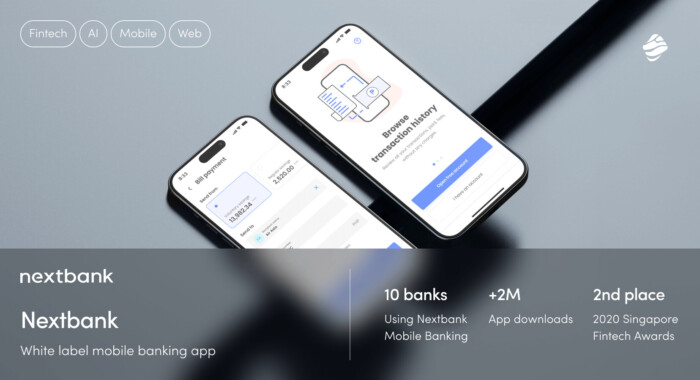
ING: AI in Risk Assessment
For example, ING uses this technology in their KYC processes, where AI-driven content summarization generates automated risk summaries during Customer Due Diligence (CDD) reviews, enhancing the speed and accuracy of risk assessments. This AI-driven approach reduces processing costs, improves fraud detection, and optimizes the allocation of human resources, ultimately improving customer satisfaction and operational efficiency.
In addition to financial applications, GenAI can be effectively integrated into a wide range of platforms, including banking apps, stock exchanges, and facility management systems. By automating the generation of statements, charts, or answers to complex questions, GenAI makes data more accessible and actionable, transforming analytics, content management systems (CMS), and business functions across industries, leading to improved efficiency and user experiences.
How can you enhance productivity and effectiveness with Generative AI?
Artificial intelligence has revolutionised the way we live and work in recent years, and the potential of this technology is only beginning to be fully achieved. One area where Gen AI tool is poised to make a significant impact is in the field of business, where it has the potential to transform the way we operate. The emergence of GenAI, in particular, has opened up exciting new possibilities for businesses looking to harness its power in terms of productivity and effectiveness. Furthermore, AI-based features can also be implemented in your digital product, such as mobile or web applications, enabling users to automatically create templates or graphics, boosting the creative teams’ productivity.
Duolingo: Language learning with GPT-4 integration
Examples of, on the one hand, so basic yet revolutionary Generative AI use cases include Duolingo, which uses GPT-4 to help language learners practice speaking and comprehension or the app Quizlet, which is expanding its offerings with Q-Chat, a new “personal learning coach” powered by ChatGPT. Similar solutions are already widely used by industries like eCommerce, entertainment, travel and retail.
Notion AI: Streamlining note-taking and summarization
There are more examples to come. A widespread tool – Notion, has levelled up its product with AI-based features, for example, by allowing users to summarise essential and actionable information from their notes. This means they no longer need to switch back and forth between their notes and a separate AI app to extract the essential information.
Instead, Notion’s AI acts as an ultra-capable teammate, helping users to keep their notes organised and making the most important information more accessible. As the information on their website states, the AI enables the users to write a summary in 30 seconds, not 30 minutes!
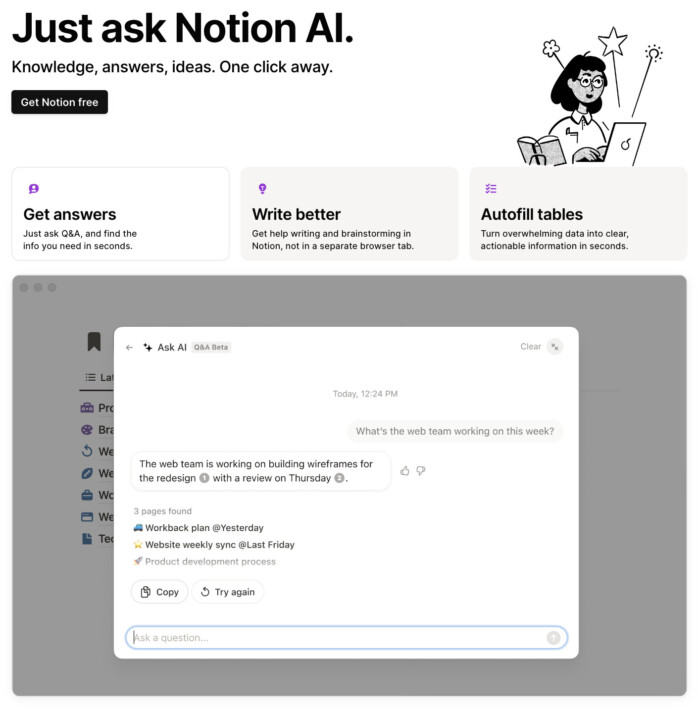
Adept’s ACT-1: Revolutionizing job efficiency
An interesting example is a company called Adept which has developed an action model, ACT-1, that is trained on how individuals interact with their computers for another perspective on job efficiency. Its purpose is to automate part of the current searching, clicking, and scrolling required by human workers to complete activities.
Uber’s AI Agents for boosting productivity
Another example of AI in action is how Uber is using AI agents to boost employee productivity, save time, and increase work effectiveness. Specifically, for customer service representatives, Uber has rolled out new tools that can summarize user communications and bring up relevant context from past interactions, allowing front-line staff to offer more accurate and efficient support.
What’s more, Uber has significantly scaled its AI and machine learning (ML) infrastructure to enhance its operational efficiency and innovation capabilities. By leveraging advanced AI and ML tools, Uber has developed a robust infrastructure that supports large-scale data processing and real-time decision-making across its platform.
This infrastructure enables Uber to optimize its services, such as matching riders with drivers, predicting demand, and improving overall user experience. The company’s commitment to scaling its AI and ML capabilities reflects its focus on continuously improving service reliability and performance as it grows globally.
How to implement generative AI into your business?
Many companies have already started using ChatGPT-powered chatbots to assist their customers. Many have also begun to try Generative AI to generate ideas, create ad copy, analyze data or automate time-consuming and tedious tasks themselves. However, from what I observed, most of the actions undertaken by companies are not organised, structured or regulated.
Many businesses still struggle with exemplary AI tool implementations in their daily business operations. In Miquido, we help our clients to fully understand the capabilities of GenAI and strategically implement it into their business by developing modern, Ai-powered features in their mobile and web applications.
How to fast-track your AI apps?
A structured approach that aligns with your business objectives is essential to fast-track your AI applications and fully leverage the potential of Generative AI.
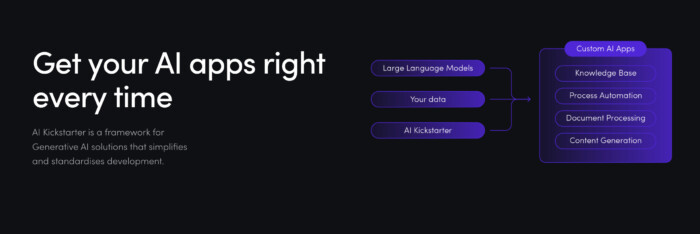
At Miquido, we offer our AI Kickstarter program, a tailored solution designed to accelerate the development and implementation of AI-powered features in your mobile and web applications. This program enables you to go from an idea to a functional Proof of Concept (PoC) in just two weeks, ensuring you can quickly test, validate, and refine AI tools that meet your specific needs.
The AI Kickstarter helps you avoid the common pitfalls of unstructured AI initiatives by providing expert guidance, rapid prototyping, and a clear strategy for integration. It is a perfect risk management strategy, allowing to to access innovation for your company in the most secure way. This way, you can streamline your operations, reduce costs, enhance customer experiences, and achieve a competitive edge with AI-driven innovation.
How much does generative AI cost? What is the best use case for your company? Let's discuss the specifics of your business and find the solution with the shortest ROI.




